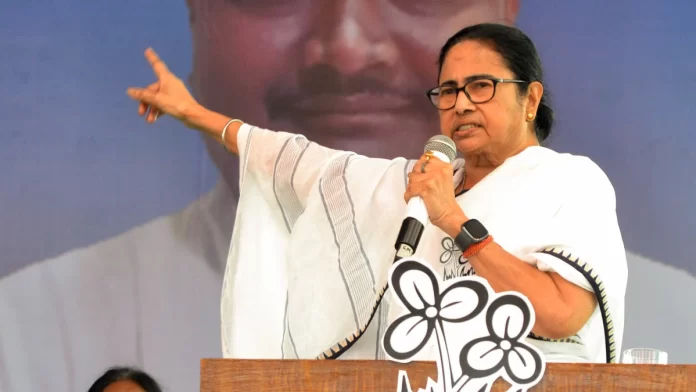Paromita Das

New Delhi: The recent outbreak of violence in Mothabari, Malda district, has once again brought political tensions in West Bengal to the forefront. Chief Minister Mamata Banerjee, known for her strong stance on secularism and law enforcement, has openly accused opposition parties of inciting communal unrest for political gain. Addressing a gathering at an Eidgah on the occasion of Eid-ul-Fitr, Banerjee reaffirmed her government’s commitment to maintaining peace and preventing riots. Meanwhile, the BJP has alleged that the law and order situation in the state has deteriorated, with targeted attacks against Hindus going unchecked. This unfolding scenario has set the stage for an intense political showdown in the state.
Mamata Banerjee’s Response to the Violence
Speaking at the Eidgah, Mamata Banerjee launched a scathing attack on opposition forces, claiming that political outfits had conspired to instigate riots in the state. She emphasized that common people do not engage in such acts of violence, but rather, it is political groups with vested interests that fuel communal discord.
Banerjee further accused the Communist Party of India (Marxist) [CPI(M)] and the Bharatiya Janata Party (BJP) of aligning against her government. Referring to the opposition as “red” (CPI(M)) and “gerua” (saffron, symbolizing the BJP), she asserted that these two forces, despite their ideological differences, have now joined hands to destabilize Bengal’s peace and harmony.
She reassured citizens that her government was prepared to fight alone if necessary, vowing to protect all communities. Her statement, “The duty of the majority is to protect the minority, and the duty of the minority is to stay with the majority,” was a call for communal harmony and unity in the face of political manipulation.
Law Enforcement’s Actions and Updates
The violence in Mothabari erupted on March 27, leading to 61 arrests and prompting internet suspension in three areas to prevent the spread of misinformation and further escalation. Additional Director General (ADG) Law and Order Jawed Shamim reassured the public that the situation was under control and that 19 cases had been registered. He stated that there had been no further incidents of violence, and the police were working diligently to restore complete normalcy in the affected areas.
BJP’s Allegations and Counterattack
The BJP, on the other hand, has strongly criticized Mamata Banerjee’s handling of the situation. Amit Malviya, BJP’s IT cell chief, took to social media to allege that Banerjee has lost control over the state’s law and order. He claimed that Hindu communities were being targeted, religious events were being disrupted, and properties belonging to Hindus were being attacked by Muslim mobs.
According to Malviya, similar incidents had occurred in Murshidabad and Purba Medinipur, where he accused radical elements of unleashing violence while the state administration allegedly remained passive. His comments suggested that West Bengal was heading towards a dangerous transformation, drawing a controversial parallel with Bangladesh’s history of communal tensions.
Political Implications and the Road Ahead
The ongoing political battle between Mamata Banerjee’s Trinamool Congress (TMC) and the BJP is only intensifying as the state gears up for upcoming elections. While Banerjee’s government maintains that it is committed to secularism and peace, the opposition continues to paint a picture of rising lawlessness under her rule.
This incident also raises questions about the role of political parties in communal conflicts. While Mamata Banerjee insists that the riots were politically motivated, the BJP’s narrative suggests that her government is failing to protect certain communities. These differing perspectives will likely shape political discourse in the coming months.
A Fragile Balance of Power
Mamata Banerjee’s firm stance against the opposition and her emphasis on secularism reflect her broader political ideology. However, the allegations of increasing communal violence pose a significant challenge to her leadership. If her administration fails to convincingly address security concerns across communities, it may give the BJP and other opposition parties a stronger foothold in the state.
On the other hand, the BJP’s aggressive rhetoric risks deepening religious polarization in West Bengal. By focusing solely on alleged Hindu victimization, it may alienate a significant portion of the electorate that values Banerjee’s pro-minority stance.
The Mothabari violence has once again ignited a fierce political and communal debate in West Bengal. While Mamata Banerjee vows to fight political forces trying to create discord, the opposition continues to highlight what they see as a deteriorating law and order situation. In a state where religious and political tensions often go hand in hand, the path to peace remains precarious. Moving forward, the real challenge will be ensuring governance that prioritizes security, social harmony, and justice for all citizens, irrespective of their political or religious affiliations.
The post Mamata Banerjee’s Stand on Mothabari Violence: A Political Battle Unfolds appeared first on Global Governance News- Asia's First Bilingual News portal for Global News and Updates.




